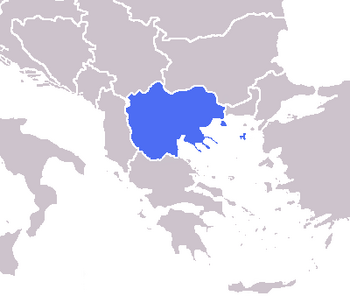Crska
Republic of Crska Република Црска | |
|---|---|
| Motto: TBA TBA | |
 Location of Crska in Europe | |
| Capital and largest city | Solun |
| Ethnic groups (2023) |
|
| Demonym(s) | Crskan |
| Legislature | TBA |
| Area | |
• Total | 68,124.5 km2 (26,303.0 sq mi) |
| Date format | mm-dd-yyyy |
Crska (Crskan: Црска), officially the Republic of Crska is a country in the Balkans region of Southeast Europe. It shares land borders with Kosovo to the northwest, Serbia to the north, Bulgaria to the northeast, the disputed territory of Western Thrace to the east, Greece} to the south, and Albania to the west. Crska also shares a small maritime border with Turkey in the Aegan Sea. Solun is the country's capital and largest city, and is home to roughly a fifth of Crska's 5.2 million citizens. Other major urban areas include Skopje, Kožani, Bitola, Serez, Prilep, and Voden. The significant majority of the country's citizens are ethnic Crskans, who are part of the South Slavic people. Crska's official language is Crskan, an Eastern South Slavic dialect which is closely related to the Bulgarian and Serbo-Croatian languages.
The country's modern history as a state begins with the Principality of Crska, an early South Slavic state which affirmed its independence after the Great Rebellion of 901-12 against the First Bulgarian Empire. Faced with constant invasions by the Bulgarians, Crska would align itself with the Byzantine Empire during the Byzantine–Bulgarian Wars and with the Ottoman Empire during the Bulgarian–Ottoman Wars. As the Bulgarians and Byzantines buckled under the weight of the Ottomans, the Principality became an vassal state and launched several invasions of the Serbian Empire with the support of the Ottoman Empire, vastly expanding its territorial borders and forming Kingdom of Great Crska. As an overture the warfighting capability of its Crskan legions and thus Great Crska was granted autonomy and special privileges which other occupied territories in the Balkans were not, which in turn allowed for the survival of an unique Crskan identity under Ottoman suzerainty.
